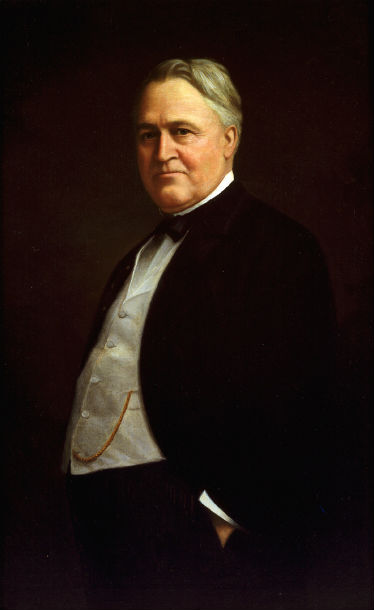
| Title | Lee Slater Overman |
| Artist/Maker | Unidentified |
| Date | n. d. |
| Medium | Oil on canvas |
| Dimensions | Sight: h. 39.625 x w. 24.5 in. (h. 100.6475 x w. 62.23 cm)
Canvas: h. 40 x w. 25 in. (h. 101.6 x w. 63.5 cm) Overall (Framed)/: h. 48 x w. 33 in. (h. 121.92 x w. 83.82 cm) |
| Credit Line | U.S. Senate Collection |
| Accession Number | 32.00032.000 |
This portrait of Lee Slater Overman, donated by the senator’s family in 1996, is unsigned and undated. The painting had been in the family since its completion early in the 20th century, although no information exists regarding its acquisition. Senator Overman had bequeathed the painting to his daughter, Grace Overman Snow, who upon her death left the work to her son, Lee Overman Snow, and his daughter, Catherine Overman Snow. Following formal acceptance of the painting in 1996, it was hung outside the Senate Democratic leader’s suite in the Capitol.
Born in Salisbury, North Carolina, Lee Slater Overman taught school before turning to law and politics. He established a law practice in Salisbury and later was elected to the North Carolina house of representatives for five terms, serving as Speaker in 1893. A Democratic candidate in 1895 for an uncompleted term in the U.S. Senate, Overman lost to the Republican/Populist candidate. Eight years later, however, he succeeded in a second bid and served in the Senate from 1903 until his death in 1930.
Overman was a tireless advocate for North Carolina interests, particularly for the state's cotton industry. As a senior member of the Judiciary Committee during World War I, he shepherded several administration policies through the Senate, including President Woodrow Wilson's proposals to impose wartime speech and press controls. He also sponsored a measure–popularly known as the Overman bill–to expand presidential power during the war. Over the course of his 27 years in the Senate, Overman served on 16 committees, including Judiciary and Appropriations. In 1913 he led a politically sensitive investigation of President Wilson's charges that lobbyists for special interests were working to undermine the administration's tariff reform agenda. Although it found no evidence of malfeasance, Overman's Judiciary subcommittee exposed extensive lobbying activity, a finding that Wisconsin Senator Robert M. La Follette, Sr., likened to a “bomb that blew the lid off the congressional lobby.” [1]
Unfailingly polite in demeanor and nonpartisan in his friendships, Overman was widely esteemed by his Senate colleagues. As a final tribute following his death, they conducted his funeral service in the Senate Chamber.
1. Arthur S. Link, Wilson: The New Freedom (Princeton, NJ: Princeton University Press, 1956), 190.